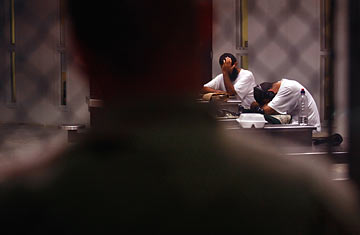
A U.S. military guard watches over detainees on Guantánamo Bay
President Barack Obama will miss his self-imposed Jan. 22 deadline to close down the military detention center at Guantánamo Bay. But sources familiar with the issue tell TIME that the President could notify Congress of his controversial plan to shutter the facility — and begin moving detainees out — in a matter of weeks. "In the coming weeks, we do anticipate that we'll reach resolution on these issues," a White House official says, speaking on condition of anonymity. 205 detainees remain in the prison, and a "goodly number" may be relocated before the end of the year, says another senior Administration official.
Obama's plan is expected to include measures that will anger both the right and the left in Washington. For example, up to 90 suspected terrorists could face indefinite detention, a Bush tactic sharply criticized by human-rights activists and also by Obama himself during his presidential campaign. But conservatives will be infuriated by the prospect of some detainees being released entirely — Administration officials expect some Yemenis who were once thought to be dangerous to win habeas corpus cases currently under way in Washington, D.C., courts. Other detainees will be repatriated to face trial in their home countries, which will lead either to jail or release. And some detainees will be transferred to third countries, most of them European, for trial or "supervised release," according to those familiar with the plan.
The Administration also plans to announce further trials in U.S. federal courts — like those planned for the alleged 9/11 conspirators in New York City — and for more detainees to face military commissions.
Among the most contentious issues the Administration has had to grapple with over closing Gitmo is that of indefinite detention. Obama opposed it during the campaign and suspended it on entering office, but then pre-empted a debate among his top advisers by embracing it at a speech at the National Archives May 21. Since then, experts within the government have struggled to come up with a policy that can reconcile the President's ideological opposition to indefinite detention with the apparent need to make use of it in order to close Guantánamo. Human-rights groups have urged Obama to apply indefinite detention only to the detainees currently at the facility, and not to future prisoners. How that question is settled could shape liberal responses to Obama's Gitmo plan.
Some 30 detainees have already been identified to be placed under what is being called "law of war detention," which allows them to be held indefinitely, and a further 60 could fall into that category. It has not yet been decided where all the prisoners under law of war detention might be sent, but most are expected to go to a facility in Thomson, Ill., or one other facility that is being looked at by the Administration. The State Department expects to be able to move 40 prisoners to other countries.
The toughest group to handle has been the approximately 100 Yemeni prisoners, many of whom are suspected of being dedicated cadres of al-Qaeda despite the absence of usable evidence against them. "We're going through our options with the Yemenis," says one official.
In what is becoming a familiar approach, the Administration is bridging the gap between a principled promise to close Gitmo and the legal and security challenges involved by producing a package with elements to please — and outrage — everyone. Given Attorney General Eric Holder's Senate grilling this week over the decision to try the 9/11 accused in New York City, the Administration can expect to face attacks from all sides when Capitol Hill gets hold of its Gitmo plan.
